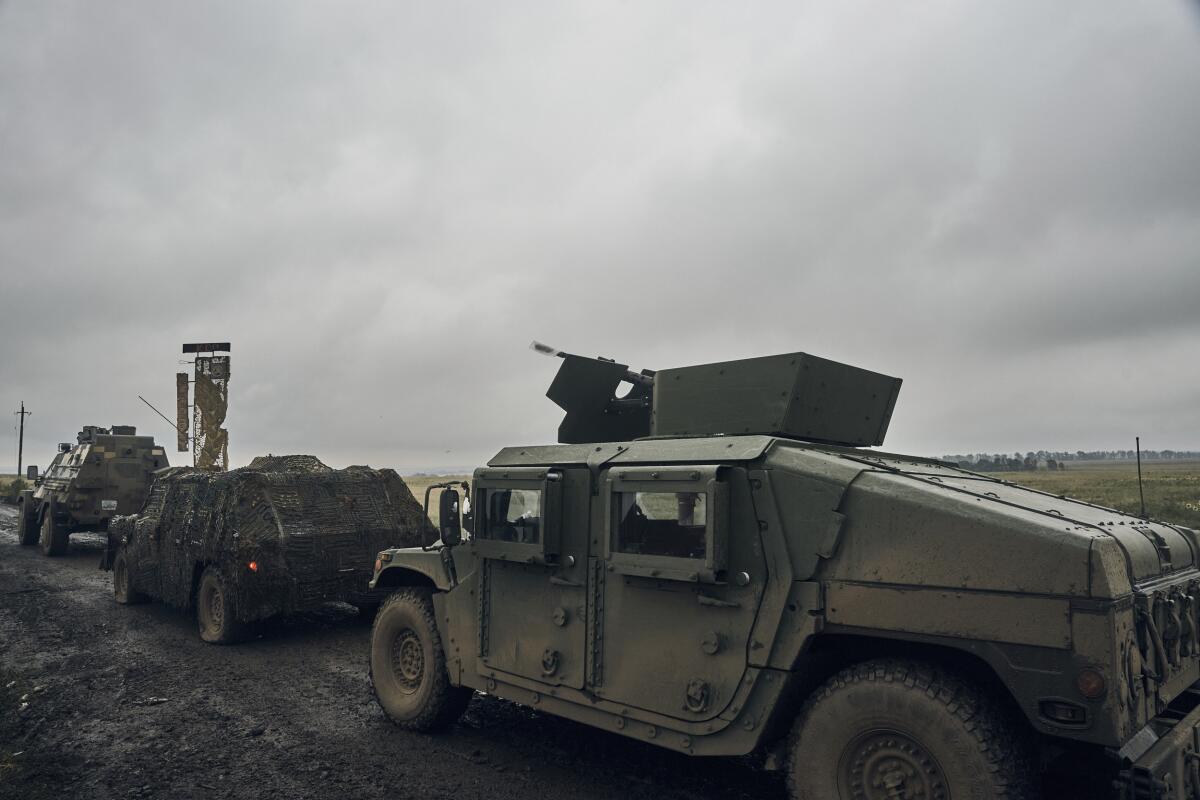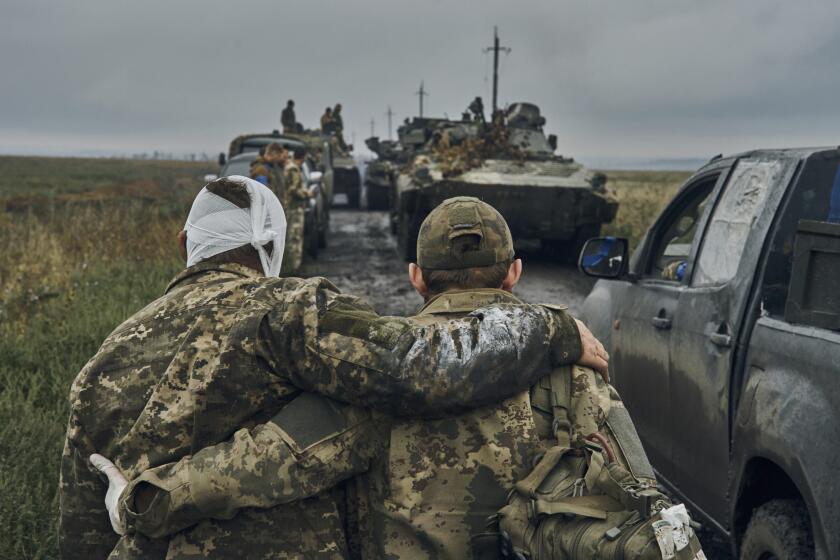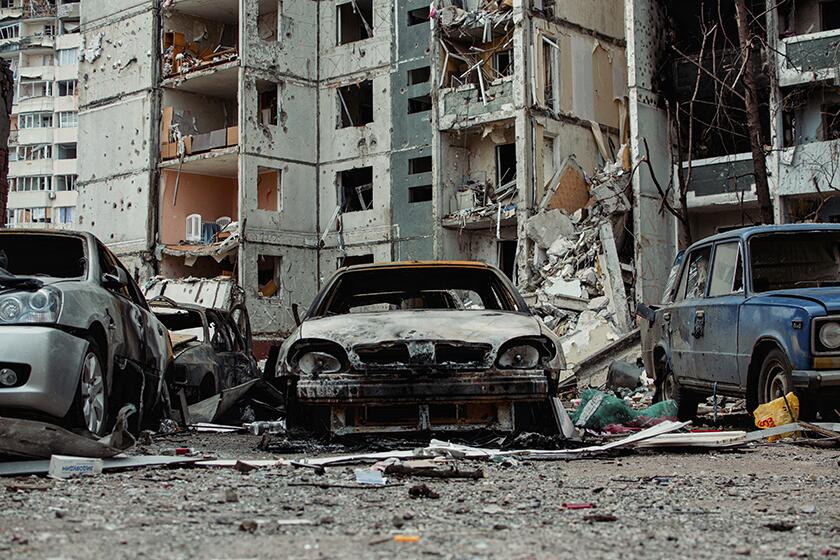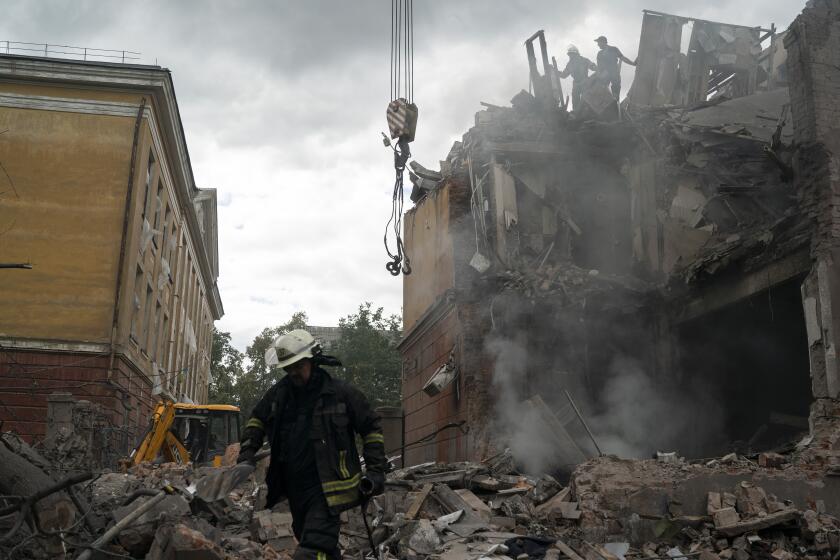Don’t declare Ukrainian victory prematurely, White House warns

- Share via
WASHINGTON — Biden administration officials are attempting to tamp down any overly optimistic expectations following Ukraine’s significant gains against Russia in recent days.
Ukraine claims to have retaken thousands of square miles of Russian-occupied territory in an offensive that began last week. Moscow acknowledged a “regrouping,” which others saw as a retreat.
“The path to victory is a difficult one, but we are sure: You are capable of it,” Ukrainian President Volodymyr Zelensky said in his nightly address Sunday, hailing his nation’s troops in what he saw as victories. “You will see our frontiers and the enemies’ backs. You will see the shining of the eyes of our people and of the occupiers’ heels.”
But in Washington, Pentagon, White House and State Department officials urged caution. They were reluctant to endorse a Ukrainian sense of triumph this early in the battle.
“It’s clear they are fighting hard to defend their country and take back territory,” White House Press Secretary Karine Jean-Pierre said Monday while traveling with President Biden to Boston. “We’re going to just continue to support their need to succeed on the battlefield. That has been our goal.”
U.S. officials said the back-and-forth trade of gains and retreats by Russians and Ukrainians was likely to continue despite the Ukrainian push that seems to have reached one section of the country’s border with Russia.
Ukraine says that it has liberated one village after another in the northeast as it pushes a counteroffensive whose success has surprised many.
Weapons supplies, weather, and the resolve in Moscow as well as in Washington and European capitals will determine how the rest of the war unfolds.
“The initial signs are positive, and we see Ukraine making real, demonstrable progress in a deliberate way,” Secretary of State Antony J. Blinken said. “But this is likely to go on for some significant period of time. There are a huge number of Russian forces that are in Ukraine, and unfortunately, tragically, horrifically, President [Vladimir] Putin has demonstrated that he will throw a lot of people into this at huge cost to Russia.”
Blinken was speaking Friday at NATO headquarters in Brussels after an unannounced trip to the Ukrainian capital, Kyiv. But his comments reflected what continued to be the dominant administration opinion Monday.
Some Europeans who have backed the U.S.-led effort to arm and support Ukraine voiced optimism that this potential breakthrough might be the moment when a weapons buildup would give way to negotiations.
Hit by Western sanctions, Russia is purchasing millions of rockets and artillery shells from North Korea for its war in Ukraine, the U.S. says.
U.S. officials, however, said that negotiations remain unlikely. Most Russian opening bids on negotiations, they said, begin with total Ukrainian capitulation — an obvious nonstarter.
In May, Biden signed a new $40 billion assistance package for Ukraine. In the months since, U.S. military aid for Ukraine has included heavier weaponry, including howitzers, armed drones and sophisticated artillery rocket systems known as HIMARS.
A senior U.S. military official said Monday that the Pentagon had confirmed some Ukrainian gains from the weekend.
“We assess the Ukrainians are making progress in their fight to liberate and reclaim territory in the south and the east on the ground in the vicinity of Kharkiv,” the official said, briefing reporters on condition of anonymity to discuss battlefield reports. “We assess that Russian forces have largely ceded their gains to the Ukrainians and withdrawn to the north and east. Many of these forces have moved over the border into Russia.”
U.S. officials’ measured response to Ukraine’s fresh battlefield successes was in keeping with the Biden administration’s approach to the conflict since the war began in February.
“We’ve been very consistent in not speaking for the Ukrainian military, either in present terms or future terms. They are fighting bravely and skillfully and should be allowed to speak for themselves,” a senior administration official said.
The Biden administration will provide $2 billion in long-term foreign military financing to Ukraine and 18 of its neighbors, including NATO members.
Biden administration officials, who less than two years ago oversaw the U.S. withdrawal from the nation’s two-decade war in Afghanistan, understand that momentum in a war can shift over time, and declaring victory too early can end up looking foolish in the long run.
Even though the U.S. has sent $13.5 billion in aid to Ukraine since January, the White House has said throughout the conflict that it is neither America’s war nor a proxy war between Putin and the West.
Early on, Biden hesitated to send Ukraine weapons that might be perceived as “offensive,” focusing instead on packages of Stinger and Javelin missile systems. Only after Ukraine withstood the initial Russian onslaught and the conflict bogged down did the U.S. begin to send more advanced weapons, including the HIMARS rocket launchers that the Ukrainians have used to devastating effect in recent days.
But U.S. officials worry that a more full-throated victory lap from Washington at this point in a still unsettled conflict could undercut Zelensky, adding credence to Putin’s claim that he is fighting a proxy war with the North Atlantic Treaty Organization and the West.
At a moment when the Russian leader is no doubt frustrated by his military’s lack of success and an invasion that may turn out to be one of the great blunders of the 21st century, any direct provocation of the still unpredictable Putin runs counter to one of Biden’s overarching objectives throughout the conflict: avoiding any direct confrontation between the U.S. and Russia.
Although Biden may be reluctant to directly poke Putin in the eye, Ukraine’s gains of the weekend do shift the calculus. The war “is not a one-sided fight” in which Moscow is destined to be the victor, said Samuel Charap, a political scientist who specializes in Russia at the Rand Corp. “This gives political emphasis to the idea that Ukraine can win.”
More to Read
Get the L.A. Times Politics newsletter
Deeply reported insights into legislation, politics and policy from Sacramento, Washington and beyond. In your inbox three times per week.
You may occasionally receive promotional content from the Los Angeles Times.















